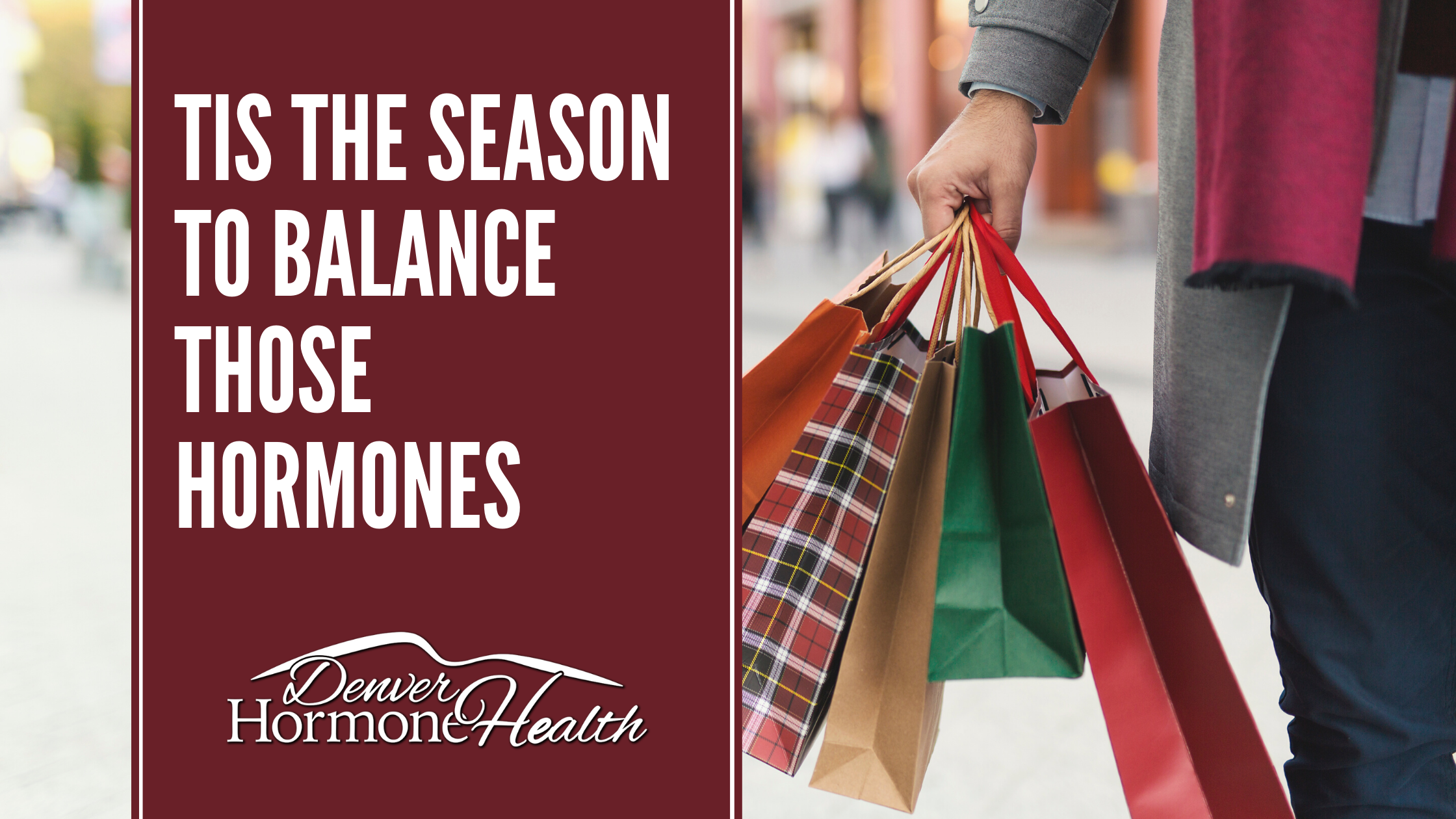TIS THE SEASON TO BALANCE THOSE HORMONES

IT’S BEGINNING TO LOOK A LOT LIKE COVID CHRISTMAS
As women, our hormones can normally take a beating over the holidays as a result of stress. But with all that’s going on out there, this year, holiday stress can come at you like a steamroller. It’s not visions of sugarplums dancing in your head. It’s visions of normally big and boisterous celebrations being cut down to those only in your household. It’s your kids wanting a dog, but discovering dogs are the new toilet paper. It’s mistletoe that might be missed due to social distancing. It can all take a big chunk out of comfort and joy.
ALEXA, HOME SCHOOL THE KIDS WHILE I’M DEALING WITH MY HORMONES
Did you know that women are twice as likely to experience stress than men? More than anything else, stress derails our hormones, affecting our mood, mind, weight, and that’s just the start of the list. Actually, our overall health takes a huge hit from stress. The more your emergency stress system is activated, the easier it becomes to trigger and the harder it becomes to shut off. The most dangerous thing about stress is how easily it can creep up on you. Below are five stress-induced hormonal imbalances that can make your holidays feel far from festive.
ALL CAUGHT UP IN THE BLACK FRIDAY BLUES
CORTISOL is the Santa of stress hormones bringing a big bag of health woes. When the pressure is on, your cortisol levels can run high. This “fight or flight” hormone makes you want to get in a sleigh and fly away from it all; the tree-trimming, cookie baking, dreidel spinning, Kwanzaa candle lighting, online shopping, Zoom arranging. Unbalanced cortisol can cause weight gain, muscle weakness, headache, fatigue and difficulty concentrating.
KEEP YOUR EYES ON THE PIES
LEPTIN is the hormone that reduces appetite and makes you feel full. Which is especially helpful when faced with holiday feasts that you’ll tend to want to gorge on since you can’t have a long table of guests to share all those gooey, fatty yummy feasts with. Leptin is our “enough already” button. When leptin levels are low, your stomach gets bigger than your eyes, your metabolism slows, fat accumulates and muscle decreases. It can also increase depression anxiety and cardiovascular disease.
DON’T GET TOO CLOSE TO THE SUGAR PLUM FAIRIES
INSULIN helps “unlock” the body’s cells so that sugar from the foods we eat can be used by the cells for energy. It also regulates carbohydrate and fat metabolism. Too much insulin can end up making you anxious, irritable, trembly, sweaty and confused. It’s enough to make your gingerbread house crumble.
WHAT THE DICKENS…
THYROID hormones, when unbalanced, can weaken or slow your heart, make you feel tired (OK, we’re going to say super tired all things considered) or out of breath. It effects your body temperature making you cold when the season should be making you feel toasty. It can also cause obesity, joint pain, high blood pressure, swelling in your ankles, as well as raise your cholesterol levels, which can increase your risk for heart problems.
OPPS, YOUR BATTERIES ARE WEARING DOWN
ESTROGEN, well you know about that. Painful periods, PMS, menopause misery, mood swings, bloating, weight gain. Estrogen levels have a domino effect on brain chemistry and affect parts of the brain that control our emotions. An estrogen imbalance can make you so crazed, you’ll be rocking around a lot more than the Christmas tree.
AND TO ALL NOT SUCH A GOOD NIGHT
PROGESTERONE is the pre-hormone of cortisol, which as we’ve said is the ultimate stress mess. It’s not a ho-ho-ho happy scenario. Low progesterone can cause low libido, sugar cravings, foggy thinking, anxiety, migraines, irregular menstrual cycles and endless nights of counting reindeer.
GOOD TIDINGS TO ALL, LADIES
Before you get all tangled up in tinsel about your hormones, there is happy news. Holidays don’t have to have your hormones roasting on an open fire. Expect “Stress” to be an unwanted house guest, but there are things you can do to cut his visit short:
- Get some exercise
- Get some rays
- Listen to music
- Dance up a TikTok storm
- Pet a dog even if it’s not your own
- Have a virtual ugliest sweater contest
- Binge watch Christmas movies
- Luxuriate in bubbles with a glass of bubbly
STAND UNDER THE MISTLETOE, GIVE YOURSELF A BIG HUG, AND CALL DENVER HORMONE HEALTH
Denver Hormone Health is at the head of the field of hormone replacement therapy. The hormone experts at DHH know hormones like no one else. And they understand just how much hormones can take the jingle out of your bells if they’re out of whack. You may feel frazzled, but the hormone specialists at DHH get it, and take the time to really listen to what’s going on. Simple tests can determine if you do have any hormone deficiencies and what they are. This allows them to create a unique treatment plan for you—one that fits perfectly, not like most gifts you get each year– to get you back to your best. Quite the gift. Time to make your hormones as merry, bright and balanced as they can be. Call Denver Hormone Health for an appointment now.
